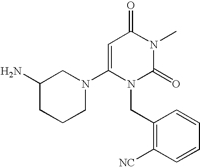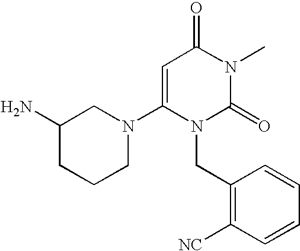In a terse, non-precedential opinion, the Federal Circuit affirmed a district court's judgment that Defendants Torrent Pharmaceuticals and Indoco Remedies Ltd. had failed to prove that the claims asserted by Plaintiff/patentee Takeda were obvious, either under the statute or the judicially created doctrine of obviousness-type double patenting, in Takeda Pharmaceutical Co. v. Torrent Pharmaceuticals Ltd.
The case arose in ANDA litigation over Takeda's allegations that Defendants would infringe claims 4 and 12 of Orange Book-listed U.S. Patent No. 7,807,689:
4. A compound of the formula

or pharmaceutically acceptable salts thereof.
12. A compound of the formula

wherein the compound is present as a benzoate salt.
These claims cover the active ingredient for Takeda's alogliptin benzoate formulations, marketed under the brand names Nesina®, Kazano®, and Oseni® for treatment of Type II diabetes. Defendants' challenges were based on factual determinations by the District Court, including testimony from three experts; based on this evidence the District Court found that Defendants had not established invalidity on either statutory (over the cited art) or obviousness-type double patenting grounds.
Not surprisingly the Federal Circuit affirmed, in an opinion by Judge Chen joined by Judges Mayer and Dyk. The Court recognized Defendants' arguments to be grounded in whether a skilled worker would have had a reasonable expectation of success, in the context of what the opinion characterized as "the undisputed factual finding" that "in the relevant art of pharmaceutical development, very small changes in molecular structure can have dramatic effects on the properties of the molecule" and "the more distantly related two chemical structures are, the less probable it will be that they have the same biological effect." Regarding obviousness-type double patenting, Defendants asserted Takeda's co-owned U.S. Patent No. 7,723,344 as disclosing a "lead compound" (termed F162 in the opinion) that upon further development would have rendered the alogliptin compound obvious. This contention was that the structural differences between these compounds (replacement of a pyrimidinone scaffold with uracil) would have been obvious in view of two scientific references, which Defendants argued taught "scaffold replacement techniques" and that uracil lowered blood glucose in animal studies, respectively. The opinion rejected this argument on the grounds that "[c]ollectively, these references, along with other evidence of record, do not demonstrate that uracil was known to possess DPP-IV inhibitory activity or other characteristics desirable in a scaffold for DPP-IV inhibition as of the relevant priority date" and accordingly that there was no clear error in the District Court's determination that Defendants failed to establish invalidity on obviousness-type double patenting grounds over this art.
Defendants' second argument in favor of obviousness-type double patenting is that the skilled worker would have been motivated to replace a fluoro-olefin substituents in F162 by an amide in alogliptin, based on the skilled worker recognizing these substituents as isosteres. The District Court had found that the skilled worker would not have been motivated to make this substitution, which the Federal Circuit held was not clear error because Defendants had not cited any art that provided this motivation and there were "myriad more conservative and predictable modifications that were available for transforming F162 into a 'novel' compound" (and Takeda had elicited an admission from Defendants' expert at trial that he did not know of any prior art disclosing this specific modification.
Turning to obviousness under 35 U.S.C. § 103, Defendants asserted art purportedly teaching substitution of a xanthine scaffold moiety for the uracil moiety in alogliptin. The Federal Circuit agreed that the District Court did not err in concluding that Defendants had not shown that the skilled worker could reasonably expected this substitution to be successful. This was because "the interchangeability references on which Indoco relies do not pertain to DPP-IV inhibitors or diabetes [thereby failing any expectation that the substituted compound would be operative], nor do they, or any other prior art of record, teach substituting an existing xanthine scaffold for uracil (thereby failing to establish the viability of the substitution on structural grounds]."
The opinion concludes by considering Defendants' argument that the District Court erred as to the level of skill of the ordinarily skilled worker. This question arose with regard to whether the skilled person should have "specific experience developing DPP-IV inhibitors and/or type II diabetes drugs," and was relevant to the weight the District Court gave to the testimony of Takeda's expert who lacked such experience. The Federal Circuit found this distinction immaterial because the District Court considered the prior art from both perspectives (i.e., a skilled artisan with and without such expertise) and found Defendants had not shown Takeda's asserted claims to be obvious ("[g]iven the substantive gaps in establishing motivation and reasonable expectation of success identified above, the record supports the district court's conclusion that it would have reached the same outcome under either definition of a skilled artisan"). Moreover, the opinion states that Defendants failed to show that applying the standard to the skilled artisan issue they espouse would have made any difference. Accordingly, the Federal Circuit affirmed the District Court's finding against Defendants.
Takeda Pharmaceutical Co. v. Torrent Pharmaceuticals Ltd. (Fed. Cir. 2021)
Nonprecedential disposition
Panel: Circuit Judges Dyk, Mayer, and Chen
Opinion by Circuit Judge Chen